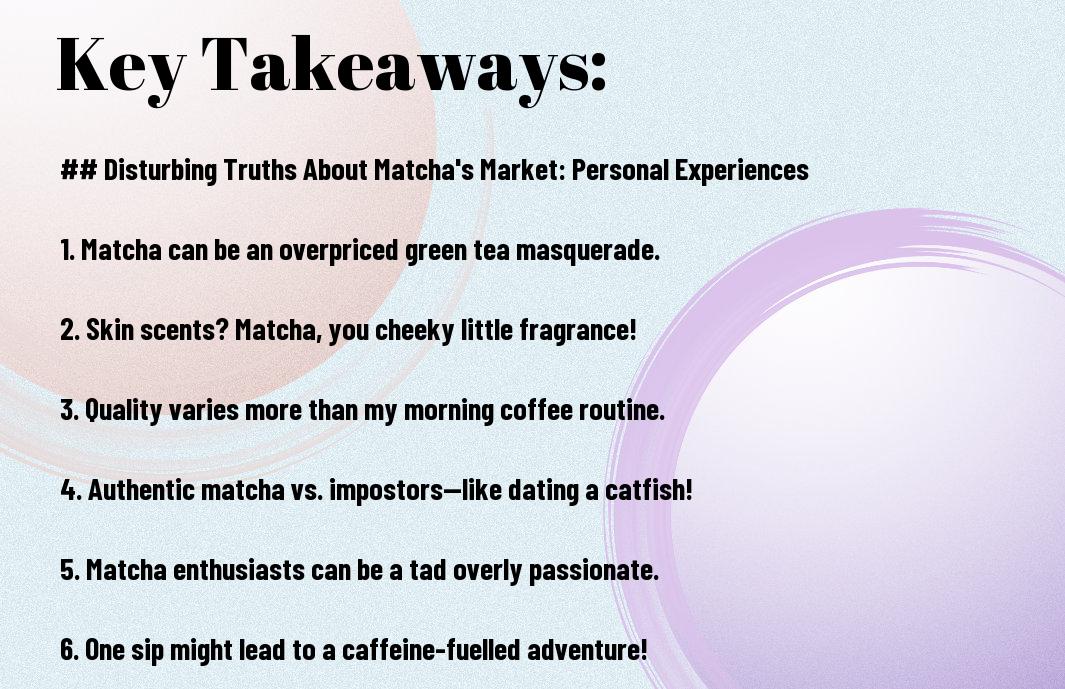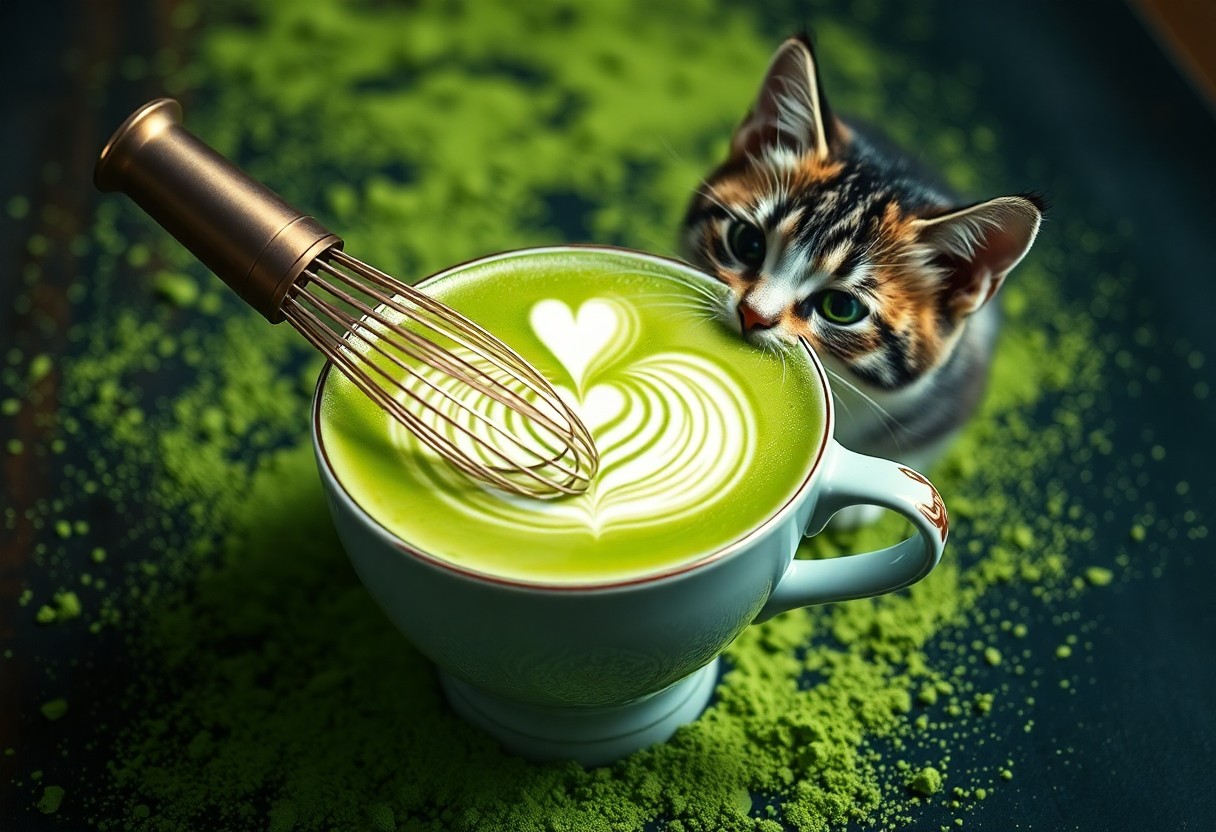Truths about matcha’s market can be a bit unsettling, especially when you’ve spent a fortune on what you think is high-quality green goodness, only to discover it’s more like green-tinted sawdust! I’ve experienced numerous mishaps with matcha, ranging from lattes that tasted like regret to a “premium” brand that paled in comparison to supermarket tea bags. Let’s not even discuss the time I purchased a “matcha skincare line” and found myself smelling like a grasshopper! Join me as I brew up the real stories behind this matcha mayhem.

Matcha’s Market
Before stepping into the vibrant world of matcha, I had no clue about the murky depths of its market. I mean, I thought I was simply indulging in my green tea obsession, not stepping into a waterfall of misleading labels and worrisome practices. Who knew that my wholesome powdered pep could have such dark secrets lurking beneath its velvety surface?
The Green Gold Rush
Between the soaring demand for matcha and its Instagrammable appeal, it’s no wonder it’s dubbed ‘green gold’. I felt like a trendsetter as I sipped my morning matcha latte. Yet, underneath that frothy finish lies a frenzy of farms scrambling to cash in—some with less-than-ethical practices. Don’t let the charming whisking skew your perception!
Fake Matcha: The Impostors Among Us
Around the matcha scene, it’s shocking how often you might unwittingly be sipping on fancy green dust rather than authentic matcha. Occasionally, it’s like being part of a dodgy detective thriller, where I find myself unmasking a faux matcha culprit at my local café. The taste of those impostors can resemble a depressing, powdered leaf version of the authentic matcha!
Market research suggests that the staggering amount of “matcha” available is nothing more than cleverly marketed green tea powder masquerading in shiny tins. It’s like Tinder but for tea—looks wonderful in pictures but often leads to a disappointing date. Therefore, the next time you’re enjoying a cup of tea, be mindful of the ingredients listed. You might want to engage in a little ‘matcha’ archaeology to ensure you’re not partaking in the fake green fiesta!
My Matcha Journey
One fine morning, I dived headfirst into the wonderful world of matcha, spurred on by its mystical green allure and promises of health benefits. I armed myself with a whisk, a bowl, and an absurd amount of enthusiasm. I had no idea that I was about to embark on a flavourful journey that would transform my kitchen into a vibrant mess fit for a sitcom episode!
From Novice to Matcha Connoisseur
For me, becoming a matcha connoisseur felt like training for the Olympics of green tea. I started by downing lattes, thinking I was a matcha expert, but I soon realised my whisking technique could use a lot of finesse. Who knew there were so many nuances to the art of frothing? Despite the steep learning curve, the process was incredibly delicious!
The Time I Tried Cooking with Matcha: A Comedy of Errors
Despite the challenges, I made the decision to prepare a matcha cake. Let me tell you, it was an experience filled with more spills than thrills! I added what I thought was a smidge of matcha, only to find I had dumped in a matcha mountain! The result? The result was a green cake so vibrant it looked like it belonged in a cartoon rather than on my dinner table!
Connoisseur may be a bit of a stretch, but that incident taught me one thing: moderation is key in cooking with matcha, especially if you don’t want your cake to glow in the dark! Picture it: a slice of luminous green cake, the guests staring in horror, and me, trying to convince them that it was absolutely delicious (which it wasn’t). Although it wasn’t my best hour in the kitchen, it undoubtedly contributed to a memorable evening. Who knew cooking could lead to so much laughter? Cheers to messy matcha adventures!
The Matcha 26 Scent Experience
Now, let me take you on a fragrant journey with Matcha 26! My first encounter with this enchanting scent was like falling into a green tea dream. It’s as if a serene Japanese tea garden decided to dance with my senses. With every spritz, I’m whisked away to a quaint café in Kyoto, dodging those pesky pigeons that always seem too keen for crumbs. Is it possible for a scent to actually taste pleasant? That’s precisely how it feels!
The Allure of Matcha in Fragrance
Scent holds great power, doesn’t it? I mean, one moment you’re standing in the daily grind, and the next, you’re enveloped in a cloud of lush green goodness. Matcha 26 draws you in with its earthy freshness, tickling your nostrils and luring your mind into a zen state, where you can almost hear the calming sound of a bamboo flute playing in the background. What’s not to love?
A Whiff of Matcha Madness
Across the room, someone walks by, and suddenly the air is filled with a mouthwatering aura of matcha. You find yourself momentarily perplexed, wondering if you’ve inadvertently entered a bakery rather than your usual café. That’s the magic of Matcha 26—it tricks your senses into believing there’s a delicious matcha latte just waiting to be sipped!
Further exploring this delightful madness, I found myself dreaming of a world where everything smells like matcha. Honestly, who wouldn’t want a pillow infused with that green gold? At one point, I nearly went out and bought a matcha plant to enhance my new obsession, but then I realised my houseplants mostly just stare at me with judgement. A small amount of Matcha 26 perfume is effective, yet occasionally I inadvertently spritz it on, attempting to convince myself that I’m attending a tea ceremony in my living room.
Uncovering the Myths
Be vigilant, my friends! The world of matcha is laden with myths that might have you questioning everything you thought you knew. From claims that it’s a miracle cure to the idea that only the pricey stuff from Japan is acceptable, there’s a lot of misinformation floating about. I have fallen for a few of these false claims myself – there was a time when I purchased a tin that seemed valuable, only to realise it was more about the packaging than the tea itself! Let’s separate fact from fiction.
Are Health Benefits Just a Trend?
At the time I began consuming matcha, every health blog was extolling its virtues. “It boosts metabolism, detoxifies, and gives you superpowers!” they said. Naturally, I thought I’d turned into a health guru overnight. But then I realised it was more about enjoying the ritual of brewing green goodness than achieving any lofty health goals. If you’re hoping for miraculous results, you might be in for a surprise!
The Matcha Snobbery Dilemma
Connoisseurs of matcha can be truly entertaining! It’s almost as if they have a secret handshake that involves knowing the precise shade of green and the correct whisking technique. I once found myself roped into a discussion about the virtues of ceremonial versus culinary grade and nearly lost my appetite entirely. I mean, aren’t we just trying to enjoy a cup of tea here?
Further, I realised that this so-called snobbery isn’t just annoying; it’s a bit entertaining too! Picture a group of friends at a café passionately arguing over who has the best matcha whisking technique, while I’m just trying to figure out how to open my packet without sending matcha flying everywhere. It’s like a scene out of a foodie sitcom. But hey, even amidst the pretentiousness, I still believe every cup should bring you joy, no matter the grade. Cheers to that!
Summing up
Despite the widespread celebration of matcha’s health benefits, it’s evident that the market conceals a few unsavoury truths. Personally, I’ve encountered the complexities of sourcing quality matcha — one afternoon, I brewed a cup that tasted suspiciously like grass clippings, much to my dismay! Furthermore, I discovered that The Matcha 26, with its delightful skin scent, was more elusive than finding a unicorn in a busy market. In my opinion, navigating this matcha maze can sometimes feel like a comedic adventure, but hey, that’s half the charm of enjoying your green tea!
Disturbing Truths About Matcha’s Market
Q: Why is matcha so popular, yet the market seems so chaotic?
A: Ah, the wonders of matcha! It seems everyone is leaping on the green bandwagon, but it’s not all frothy lattes and zen vibes. In my early days of matcha, I fervently touted its health benefits to anyone who would listen, including those who wouldn’t! But then I dug deeper and discovered some brands are imperatively using the word “matcha” like it’s confetti. For instance, I ended up with a bag of matcha that looked suspiciously like pond scum in my cupboard. Warning: it tasted just as bad! Ensuring quality can be a challenge, leading to some products being more ‘meh’ than matcha.
Q: Is all matcha created equal?
A: Oh dear, if only it were that simple! It’s a bit like dating: there’s excellent matcha, and then there’s the matcha that makes you reconsider your life choices. During my quest for the perfect cup, I tried a fancy “ceremonial-grade” matcha and was ready to throw confetti— it was divine! Then I thought I’d be clever and purchase one from a discount supermarket. Let’s just say the taste was about as enjoyable as chewing grass. So, always check the grade before you buy! Aim for the good stuff; it’s worth the effort – and it’s less likely to make you rethink your life decisions.
Q: What’s the deal with the price of matcha?
A: Ah, matcha is that one friend who always wants to go to the posh places. Some matcha can cost more than a pint in London! I paid thirty quid for a tiny tin of matcha, believing it to be a zen experience. But let me tell you, using it in baking was surprisingly less expensive than dining at a sushi restaurant every week. So, if you want to splurge, just remember you could be enjoying a delightful green tea cake instead of being the barista at that coffee shop with a matcha obsession.
Q: Should I trust matcha labels and their claims?
Putting your trust in matcha labels can be akin to entrusting a cat to monitor your fish. Trusting matcha labels can be a challenging task. I once fell prey to a label proclaiming “100% pure matcha” only to discover a mysterious blend slapped with a fancy name. It was like finding out it was a ‘limited edition’ catfish instead of the majestic salmon I expected. Always seek out reputable brands; if a product boasts features such as “organic” or “Japanese”, it’s typically a more secure choice. Otherwise, you may receive a matcha that leaves you feeling deceived by a dishonest car dealer.
Q: Can matcha really improve my well-being, or is it all hype?
A: Well, I’d love to say that matcha will make everything sunshiny and cheerful, akin to an adorably animated film! In reality, while it offers benefits like a gentle caffeine boost and antioxidants, it won’t magically turn you into a productivity machine. I once downed three cups expecting to bounce around like a toddler on a sugar rush; instead, I just felt a tad jittery and slightly confused as to whether I was experiencing peak productivity or a caffeine-induced existential crisis. So, moderation is key! Enjoy it with a dash of humour, and don’t anticipate miracles unless you’re willing to laugh at yourself!





